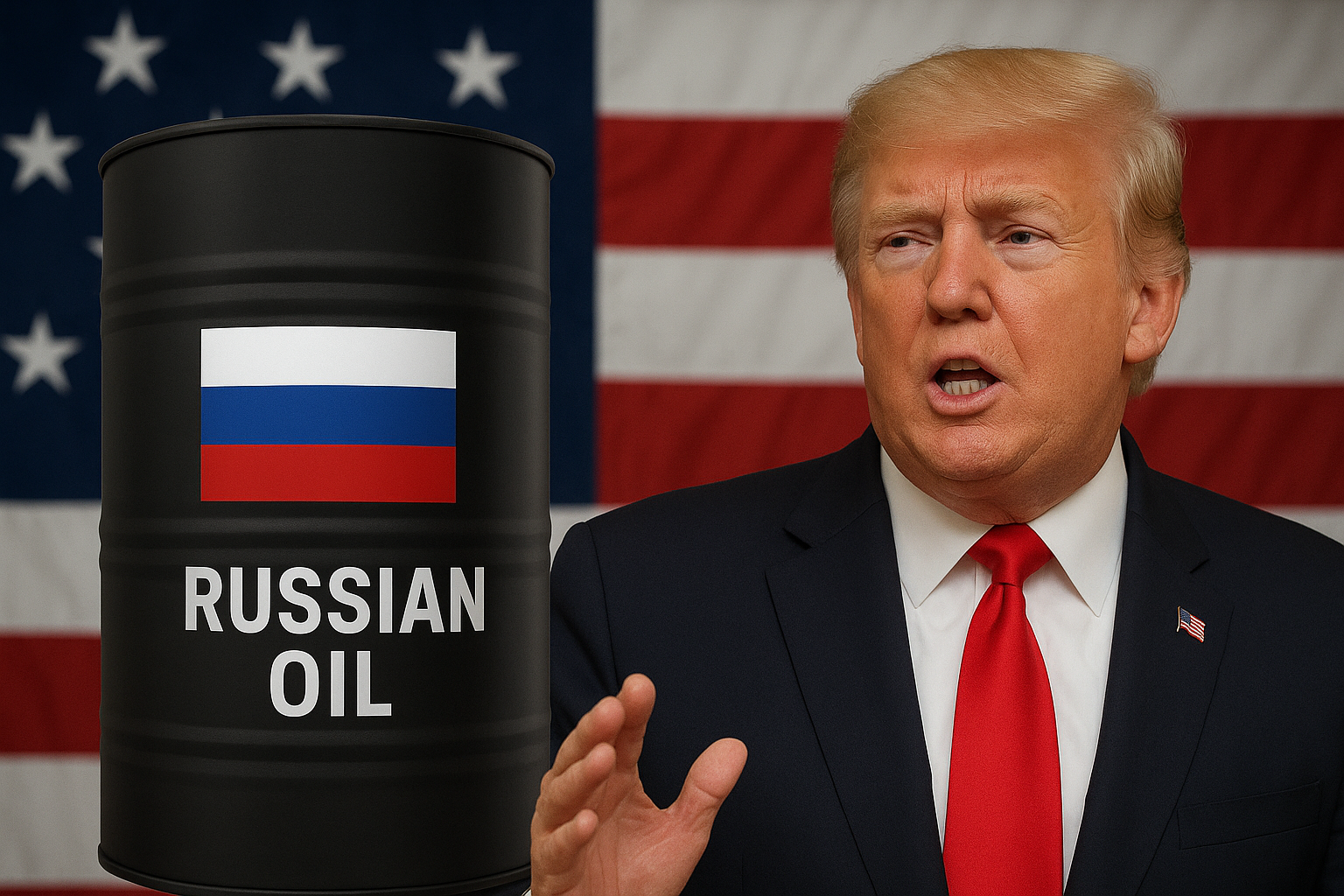US President Donald Trump has signaled that he is ready to impose sweeping sanctions on Russian oil, but only if NATO members collectively take the same step.
A day after publicly expressing his growing frustration with Russian President Vladimir Putin over the prolonged war in Ukraine, Donald Trump signaled a tougher stance. Writing on his Truth Social platform, the former president said he is “prepared to launch major sanctions on Russia once every NATO nation has agreed and actually stopped buying oil from Russia.”
Trump’s comments reflect a shift from his earlier reluctance to impose fresh punitive measures on Moscow as he pursued direct talks with Putin. The statement suggests he is now willing to embrace sweeping economic steps, but only if they are coordinated across NATO, highlighting his belief that sanctions are most effective when enforced collectively.
By linking his proposed measures to NATO unity and the cessation of Russian oil purchases, Trump underscored two recurring themes in his foreign policy rhetoric: frustration with what he perceives as uneven burden-sharing within the alliance, and the view that continued European dependence on Russian energy weakens the West’s negotiating power. His remarks add to mounting signs that patience in Washington with Moscow’s intransigence is waning, and that energy trade remains at the heart of the geopolitical struggle over Ukraine. While many European countries have already scaled back or ended their imports of Russian oil, several NATO allies — most notably Hungary — continue to resist tougher EU measures targeting Moscow’s lucrative energy exports. This division within NATO and the EU has slowed attempts to fully cut off Russia’s oil revenues, which remain a critical source of funding for the Kremlin’s war effort.
According to a report, the US is also considering broader steps to tighten the squeeze on Moscow. Washington intends to push its G7 partners to slap tariffs of up to 100% on countries like China and India that continue purchasing Russian crude. Such measures are aimed at reducing the global market for Russian energy and raising economic pressure on Putin to reconsider his invasion of Ukraine.
Former President Donald Trump suggested that NATO could jointly impose steep tariffs—ranging from 50% to 100%—on Chinese goods as an additional measure to pressure Russia over its war in Ukraine. He emphasized that such tariffs would be lifted once the conflict comes to an end, framing the move as both a way to accelerate peace and as a show of collective resolve against Moscow.
Trump’s proposal highlights his strategy of leveraging global trade as a geopolitical tool. While he has sometimes struck a conciliatory tone toward Beijing—continuing to push for a summit with Chinese President Xi Jinping and seeking a new trade deal with the world’s second-largest economy—his suggestion of sweeping tariffs reflects a harder line. Experts caution, however, that any such action would almost certainly provoke a sharp retaliatory response from China, risking a destabilization of the fragile trade truce currently in place between Washington and Beijing.
Meanwhile, the Biden administration’s top economic officials are preparing for high-level talks with their Chinese counterparts. Treasury Secretary Scott Bessent and U.S. Trade Representative Jamieson Greer is set to hold talks with Chinese officials in Madrid in the coming days. The talks come as G-7 finance ministers, meeting on Friday, also discussed ways to ramp up economic pressure on Russia and close loopholes in existing sanctions.
Until recently, Donald Trump had held back from imposing new sanctions on Russia, preferring instead to focus on brokering a negotiated peace with President Vladimir Putin. His approach centered on diplomacy rather than escalation, culminating in a high-profile summit in Alaska. That meeting, however, produced no tangible progress toward halting Russia’s ongoing military campaign in Ukraine. Efforts to arrange a three-way dialogue with Ukrainian President Volodymyr Zelenskiy also fell through, further undercutting Trump’s push for direct negotiations.
In the aftermath of the Alaska summit, Russia escalated its military campaign with a wave of heavy airstrikes on Kyiv, carried out over several consecutive days. The sustained bombardments not only highlighted Moscow’s determination to press ahead with the war but also cast doubt on the effectiveness of Trump’s diplomatic overtures. What had been an attempt to de-escalate tensions through dialogue instead reinforced the perception that Putin remained unmoved by negotiations.
This aggressive turn of events appears to have shaken Trump’s confidence in diplomacy as a standalone tool. Observers note that his tone has grown increasingly sharp, suggesting that the former president—who had previously emphasized engagement with Putin—may now be re-evaluating his strategy. The persistence of Russian attacks has fueled speculation that Trump is transitioning from patience to frustration, laying the groundwork for a pivot toward tougher measures, including economic sanctions or coordinated pressure through NATO.
For allies in Europe and policymakers in Washington, Trump’s shifting posture could mark an important turning point. If he abandons his earlier reluctance to confront Moscow more forcefully, it may open the door to a broader realignment of Western strategy—one that relies less on dialogue and more on coercive pressure to curb Russia’s war effort.
Reflecting this frustration, Trump criticized NATO allies for what he sees as a lack of resolve. “NATO’s dedication to securing victory has been less than absolute, and it’s alarming that some members are still buying Russian oil. It severely undermines their negotiating position and bargaining power with Russia,” he wrote, signaling that he views economic leverage as essential to strengthening the West’s hand in any future talks.
Hungarian Prime Minister Viktor Orbán—one of Trump’s closest allies in Europe and a long-time partner of Vladimir Putin—remains among the staunchest opponents of energy sanctions targeting Moscow. Orbán has repeatedly argued that punitive measures on Russian oil and gas would damage Hungary’s economy far more than they would hurt the Kremlin, a stance that has often put him at odds with other EU and NATO members seeking to tighten the pressure on Russia.
Budapest’s position is reinforced by its deep energy ties to Moscow. Hungary maintains a long-term contract with Russia’s state-owned Gazprom PJSC, securing 4.5 billion cubic meters of natural gas annually under a deal that runs until 2036. On top of that, the Orbán government has increased purchases since 2022 to cushion domestic consumers from price shocks. These arrangements effectively lock Hungary into dependence on Russian supplies for the foreseeable future, limiting its willingness to support broader European efforts to curtail Moscow’s energy revenues.
Orbán’s resistance underscores a broader challenge for NATO and the European Union: while the majority of member states favor tougher sanctions and energy diversification, a handful of countries with structural reliance on Russian fuel remain reluctant to break ties. This divergence not only weakens the West’s economic leverage over Russia but also exposes internal divisions at a time when unity is being tested by the protracted war in Ukraine.

